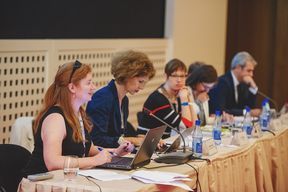Search
News categories
Media Literacy: an increasingly important duty for regulators - Update
Media Literacy: an increasingly important duty for regulators
[Updated news item with a link to the Turkish presentation]
 During the 39th EPRA meeting in Budva (Montenegro), a working group entitled "Empowering Users: Focus on Media Literacy" met on 8 May 2014 to take stock of new developments at national and European level, collect best practices and conduct benchmarking on the roles and responsibilities of regulatory authorities compared to other media players.
During the 39th EPRA meeting in Budva (Montenegro), a working group entitled "Empowering Users: Focus on Media Literacy" met on 8 May 2014 to take stock of new developments at national and European level, collect best practices and conduct benchmarking on the roles and responsibilities of regulatory authorities compared to other media players.
*Picture courtesy of the Agency for Electronic Media of Montenegro ©
On this occasion, panellists from the Catalan, Turkish, German and UK regulators presented their experience and engaged in a debate with the group. A representative of the Eurovision Academy reported on current EBU projects and generally on the role played by public broadcasters to develop media literacy.
Media Literacy was last addressed at an EPRA meeting in 2008 when very few regulators had a duty in the field of this relatively new concept. On the basis of a survey about regulators and media literacy, the British Ofcom - who acted as group coordinator - produced a comprehensive comparative paper which showed that a greater number of regulators were becoming more active in this area and activity could be categorised into four key areas:
-
Education and awareness
-
Research and report writing
-
Stakeholder collaboration, and to a lesser extent
-
Content classification.
Key findings from the Working Group
-
While there is no universally agreed definition of media literacy at a European, national or regional level, there is general agreement on what it means – which is to access, understand, critically evaluate media. This often, but not universally, includes safe and responsible use. Media Education, normally through schools, is also a key concept, as are creativity and self-expression.
-
Addressing the media literacy needs of children was evident in all presentations. Despite this focus, it was also acknowledged that media literacy was a life-long learning activity, particularly in the context of a converged media world and the challenges that regulators face in relation to managing freedom of expression and hate speech issues.
-
Professionals from all sectors need media literacy training before they can help to play their role as in promoting media literacy. The EBU presented the programme they were developing to help public service broadcasters understand what media literacy was and the benefits of promoting media literacy for public broadcasters.
-
Despite the acknowledgement that media literacy was an area of growing importance of regulators, funding for this area remains problematic for some regulators who are operating on little or no budget.
-
The importance of a participatory multi-stakeholder approach was a recurring theme, with almost every regulatory authority working with stakeholders on this topic, particularly in relation to funding and outreach.
This EPRA Working Group is a yearly workgroup with two sessions revolving around the topic of "Empowering Users". The next meeting of the group, which will take place on 9 October in Tbilisi on the occasion of the 40th EPRA meeting, will focus on the implementation of Protection Tools.
Source: EPRA Secretariat
Attached Documents
See also
- Regulators and Media Literacy posted on 11 March, 2016